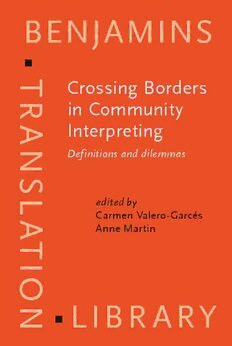
Crossing Borders in Community Interpreting: Definitions and Dilemmas (Benjamins Translation Library, Volume 76) PDF
305 Pages·2008·3.554 MB·English
Most books are stored in the elastic cloud where traffic is expensive. For this reason, we have a limit on daily download.
Preview Crossing Borders in Community Interpreting: Definitions and Dilemmas (Benjamins Translation Library, Volume 76)
Description:
At conferences and in the literature on community interpreting there is one burning issue that reappears constantly: the interpreter's role. What are the norms by which the facilitators of communication shape their role? Is there indeed only one role for the community interpreter or are there several? Is community interpreting aimed at facilitating communication, empowering individuals by giving them a voice or, in wider terms, at redressing the power balance in society?In this volume scholars and practitioners from different countries address these questions, offering a representative sample of ongoing research into community interpreting in the Western world, of interest to all who have a stake in this form of interpreting. The opening chapter establishes the wider contextual and theoretical framework for the debate. It is followed by a section dealing with codes and standards and then moves on to explore the interpreter's role in various different settings: courts and police, healthcare, schools, occupational settings and social services.
See more
The list of books you might like
Most books are stored in the elastic cloud where traffic is expensive. For this reason, we have a limit on daily download.
